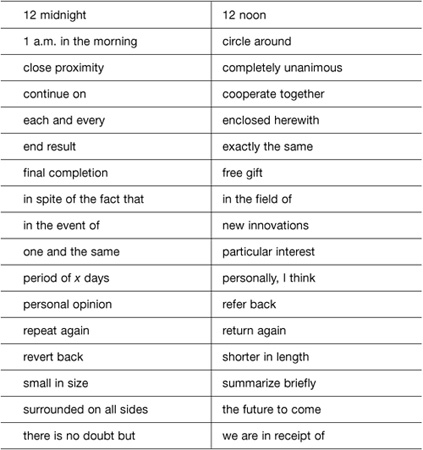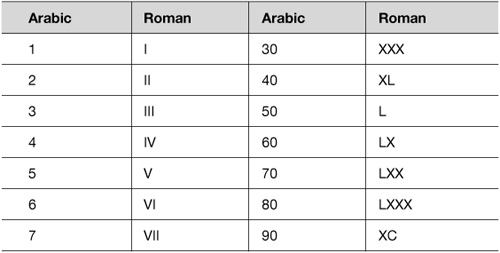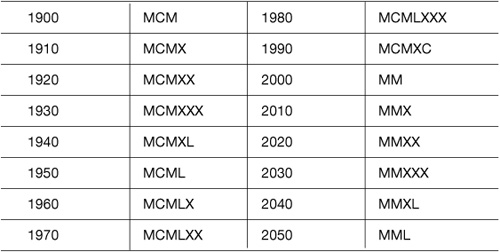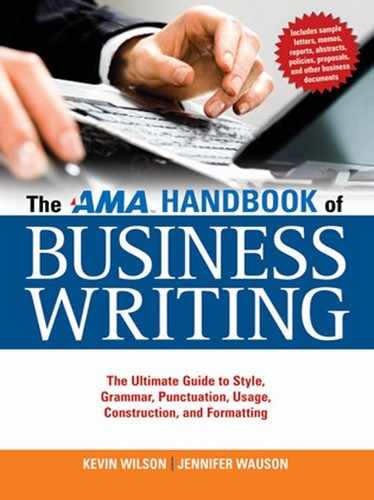R
RAISE, RISE
Raise is a transitive verb and always takes an object. Rise is an intransitive verb and never takes an object.
Correct: They raise the question [object] at every meeting.
Correct: I rise to make a motion.
RATIONAL, RATIONALE
Rational is an adjective that means logical or reasonable. Rationale is a noun that means a belief or controlling principle.
Correct: Any rational person would agree.
Correct: My rationale is that centralizing control destroys individual initiative.
REAL
Don’t use real when you really mean very.
Incorrect: He is real assertive.
Correct: He is very assertive.
RECIPROCAL PRONOUNS
The reciprocal pronouns, each other and one another, are used to express mutuality.
Example: My brother and I always give each other a hard time.
If more than two people are involved, use one another.
Example: The team members gave one another high fives.
Reciprocal pronouns can also take the possessive form.
Example: They borrowed each other’s clothes.
RECUR, REOCCUR
Recur means to return to, to come back, or to occur again and again.
Example: The problem recurred yesterday for the tenth time.
Recurrence means one of several repetitions.
Example: If there’s a recurrence of the fever, you must see the doctor.
Reoccur means a single repetition.
Example: The creaking sound in the attic reoccurred an hour later.
Related words include reocurrence and recurrent.
REDUNDANCY
Although a well-rounded writing style includes compound and complex sentences, it is important to avoid redundancy, that is, saying the same thing twice. Table 2.24 presents a list of some of the most common redundant phrases.
Table 2.24 Common Redundant Phrases

REFLEXIVE PRONOUNS
Reflexive pronouns indicate that the subject in a sentence also receives the action of the verb. Reflexive pronouns are formed by adding -self or -selves to the pronoun.
Example: People who cheat on their taxes are only hurting themselves [reflexive pronoun].
Whenever a reflexive pronoun is in a sentence, the sentence must contain a person to whom the pronoun can reflect.
Incorrect: Please give the food to myself. [The sentence contains no other subject such as “I.”]
Example: I gave myself the credit.
Reflexive pronouns are the same as intensive pronouns (myself, yourself, herself, himself, ourselves, and themselves). There is a tendency to use reflexive and intensive pronouns (ending in -self) when they are not appropriate.
Incorrect: These books will be read by myself.
Correct: These books will be read by me.
The indefinite pronoun one has its own reflexive form.
Example: One must trust oneself.
Other indefinite pronouns use either himself or themselves as reflexives.
REGARD, REGARDS
When making a reference to something, write with regard to. At the end of correspondence, write regards.
Regardless is often used as an adverb that means despite everything. The word irregardless is nonstandard and should not be used.
REGULAR VERBS
Regular verbs take an -ed to form the past simple and past participle tenses.
Example: talk, talked
Regular verbs that end in e take a -d to form these tenses.
Example: joke, joked
RELATIVE ADVERBS
Adjectival clauses can be introduced by relative adverbs: where, when, and why.
The relative word itself serves in an adverbial function, modifying the verb in the clause. The relative adverb where begins a clause that modifies a noun of place.
Example: My family now lives in the town where [modifies “used to be”] my grandfather used to be sheriff. [The entire clause modifies the noun “town.”]
A when clause modifies nouns of time.
Example: My favorite day of the week is Friday, when the weekend is about to begin.
A why clause modifies the noun reason.
Example: Do you know the reason why school is out today?
Sometimes the relative adverb is left out of these clauses and the writer substitutes that instead.
Example: Do you know the reason that school is out today?
RELATIVE CLAUSES
A relative clause modifies a noun or noun phrase in a sentence. Relative clauses are dependent clauses introduced by a relative pronoun (that, which, whichever, who, whoever, whom, whomever, whose, and of which).
Example: John said that his knee, which had bothered him ever since the accident, [relative clause] needed surgery.
Example: Cathy didn’t get the promotion, which really surprised everyone in the office.
RELATIVE PRONOUNS
The relative pronouns who, whoever, which, and that relate to groups of words, nouns, and other pronouns.
Example: I don’t know why she said that.
Example: This is the house that had the fire.
The pronoun who connects the subject to the verb within a dependent clause.
Example: That is the woman who used to be a teacher.
Choosing between which and that and between who and whom is difficult for many people. Generally, use which to introduce clauses that are parenthetical in nature; in other words, they can be removed from the sentence without changing the meaning of the sentence.
![]() A who clause is often set apart with a comma or a pair of commas.
A who clause is often set apart with a comma or a pair of commas.
![]() Use that to introduce clauses that are indispensable for the meaning of the sentence. That clauses are not set apart by commas.
Use that to introduce clauses that are indispensable for the meaning of the sentence. That clauses are not set apart by commas.
![]() The pronoun which refers to things, who refers to people, and that usually refers to things but may also refer to people in a general way.
The pronoun which refers to things, who refers to people, and that usually refers to things but may also refer to people in a general way.
The expanded relative pronouns whoever, whomever, and whatever are known as indefinite relative pronouns. They do not define any thing or person in particular.
Example: The company will hire whomever [indefinite relative pronoun] it pleases.
Example: She seemed to say whatever came to mind.
Example: Whoever took the money will be punished.
What can be an indefinite relative pronoun when used to introduce a dependent clause.
Example: He will give you what you need for the trip.
REOCCUR
REPORTED SPEECH
Reported speech, also called indirect speech, is used to express what someone else said without using his or her exact words. The characteristics of reported speech are that:
![]() Exact quotes and quotation marks are not used.
Exact quotes and quotation marks are not used.
![]() Pronouns are often changed.
Pronouns are often changed.
![]() Verb tense is usually changed.
Verb tense is usually changed.
Exact quote: I’m going to declare bankruptcy.
Reported speech: He said he was going to declare bankruptcy.
RESTRICTIVE CLAUSES
A restrictive clause restricts the meaning of the preceding subject.
Nonrestrictive clauses also tell you something about the preceding subject, but they do not limit the possible meaning.
Restrictive clauses normally begin with that. Nonrestrictive clauses normally begin with which.
Example: The assistant bound the reports that were less than 30 days old [restrictive clause; the assistant bound only the reports that were less than 30 days old].
Example: The assistant bound the reports, which were less than 30 days old [nonrestrictive; the assistant bound reports and all of them were less than 30 days old].
RESULTATIVE ADJECTIVE
A resultative adjective is placed after the noun it modifies and changes the meaning of the verb and its action on the noun.
Example: He wiped the desk clean.
Example: He painted the office green.
RESUMPTIVE MODIFIER
A resumptive modifier takes a word from a sentence that appears to be ending and adds additional information.
Example: You’ll find working with Videologies to be both enlightening and rewarding—enlightening due to the many innovations we’ll introduce to your company, rewarding because of the enhancements to productivity your company will experience [resumptive modifier].
RHETORICAL QUESTION
A rhetorical question is asked to make a point and when an answer is not expected. The answer for a rhetorical question is usually obvious.
Example: Who is responsible for running the company—the customers, the employees, or the managers?
RHYME
Rhyme is a literary technique used in poetry where words at the ends of lines sound similar.
RIGHT, BUSINESS
RIGHT-CLICK
RISE, RAISE
ROMAN NUMERALS
Roman numerals are often used in outlines and some dates. Table 2.25 contains the most commonly used Roman numerals. Table 2.26 contains common Roman dates.
Table 2.25 Most Common Roman Numerals

Table 2.26 Common Roman Numeral Dates

ROOT, ROUT, ROUTE
Root can be:
![]() A noun that means the part of a plant that grows beneath the ground.
A noun that means the part of a plant that grows beneath the ground.
![]() A verb that means to develop roots or to dig in the earth.
A verb that means to develop roots or to dig in the earth.
![]() A verb that means to applaud or cheer for someone.
A verb that means to applaud or cheer for someone.
Rout can be:
![]() A noun that means a terrible defeat or retreat.
A noun that means a terrible defeat or retreat.
![]() A verb that means to defeat soundly.
A verb that means to defeat soundly.
Route can be:
![]() A noun that means an avenue of travel such as a road.
A noun that means an avenue of travel such as a road.
![]() A verb that means to select a particular pathway.
A verb that means to select a particular pathway.
RUN
When referring to a business or organization, don’t use run in place of manage.
Incorrect: He runs the bakery.
Correct: He manages the bakery.

